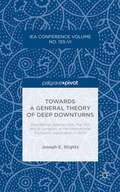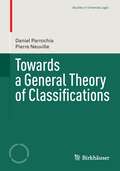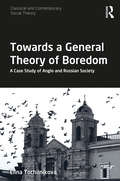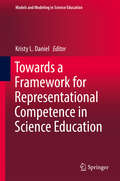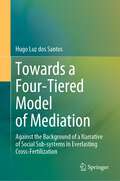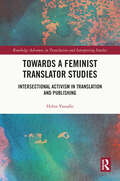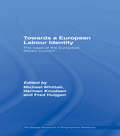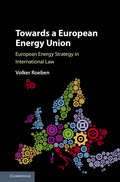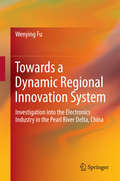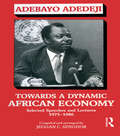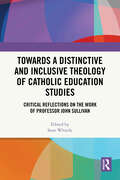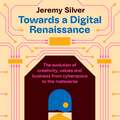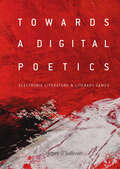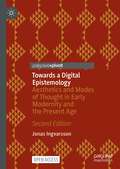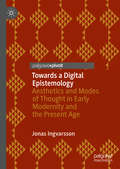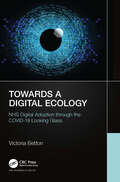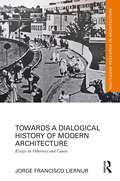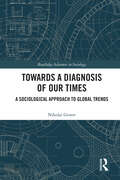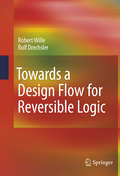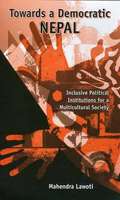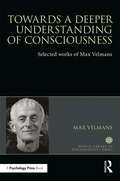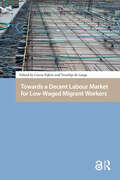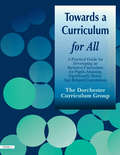- Table View
- List View
Towards a General Theory of Deep Downturns: Presidential Address from the 17th World Congress of the International Economic Association in 2014 (International Economic Association #155-VI)
by Joseph E. StiglitzTowards a General Theory of Deep Downturns
Towards a General Theory of Classifications
by Daniel Parrochia Pierre NeuvilleThis book is an essay on the epistemology of classifications. Its main purpose is not to provide an exposition of an actual mathematical theory of classifications, that is, a general theory which would be available to any kind of them: hierarchical or non-hierarchical, ordinary or fuzzy, overlapping or non-overlapping, finite or infinite, and so on, establishing a basis for all possible divisions of the real world. For the moment, such a theory remains nothing but a dream. Instead, the authors essentially put forward a number of key questions. Their aim is rather to reveal the "state of art" of this dynamic field and the philosophy one may eventually adopt to go further. To this end they present some advances made in the course of the last century, discuss a few tricky problems that remain to be solved, and show the avenues open to those who no longer wish to stay on the wrong track. Researchers and professionals interested in the epistemology and philosophy of science, library science, logic and set theory, order theory or cluster analysis will find this book a comprehensive, original and progressive introduction to the main questions in this field.
Towards a General Theory of Boredom: A Case Study of Anglo and Russian Society (Classical and Contemporary Social Theory)
by Elina TochilnikovaThrough comparative historical research, this book offers a novel theory explaining the emergence of boredom in modernity. Presenting a Durkheimian topology of cross-cultural boredom, it grounds the sociological cause of boredom in anomie and the perception of time, compares its development through case studies in Anglo and Russian society, and explains its minimal presence outside of the West. By way of illustrative examples, it includes archetypes of boredom in literature, art, film, and music, with a focus on the death of traditional art, and boredom in politics, including strategies enacted by Queer intellectuals. The author argues that boredom often results from the absence of a strong commitment to engaging with society, and extends Durkheim’s theory of suicide to boredom in order to consider whether an imbalance between social regulation and integration results in boredom. The first book to scientifically explain the historical emergence and epidemic of boredom while engaging with cutting edge political debates, Towards a General Theory of Boredom will appeal to scholars across the social sciences with interests in social theory, social psychology, and sociology.
Towards a Francophone Community
by Robin S. GendronUsing extensive archival research, Gendron rebuts the argument of Quebec nationalists and scholars that the Canadian government's neglect of French Africa forced Quebec to develop its own international identity. Towards a Francophone Community shows that there had been active federal interest in French African affairs since the late 1940s, within the context of developments in NATO and the Cold War, the vagaries of Canada's relations with France, and the Quiet Revolution in Quebec.
Towards a Framework for Representational Competence in Science Education (Models and Modeling in Science Education #11)
by Kristy L. DanielThis book covers the current state of thinking and what it means to have a framework of representational competence and how such theory can be used to shape our understanding of the use of representations in science education, assessment, and instruction. Currently, there is not a consensus in science education regarding representational competence as a unified theoretical framework. There are multiple theories of representational competence in the literature that use differing perspectives on what competence means and entails. Furthermore, dependent largely on the discipline, language discrepancies cause a potential barrier for merging ideas and pushing forward in this area. While a single unified theory may not be a realistic goal, there needs to be strides taken toward working as a unified research community to better investigate and interpret representational competence. An objective of this book is to initiate thinking about a representational competence theoretical framework across science educators, learning scientists, practitioners and scientists. As such, we have divided the chapters into three major themes to help push our thinking forward: presenting current thinking about representational competence in science education, assessing representational competence within learners, and using our understandings to structure instruction.
Towards a Four-Tiered Model of Mediation: Against the Background of a Narrative of Social Sub-systems in Everlasting Cross-Fertilization
by Hugo Luz SantosUnderpinned by a hybrid methodology (ranging from social sciences to human sciences), this book parses mediation in four perspectives, which stands as an unparalleled methodological approach so far.Mediation has long been tethered to piecemeal and haphazard approaches, which have flatly failed to capture the gist of the uniqueness of this (often) poorly latched on (and poorly understood) dispute resolution mechanism. This book argues that, in order to fully grasp the richness of such dispute resolution mechanism, mediation must be parsed in four tiers. The first tier is the social dynamics of mediation. The second tier is the cultural dynamics of mediation. The third tier is the legal dynamics of mediation. The fourth tier is the cross-border and cross-cultural dynamics of mediation.Taken together, the four tiers that premise the four-tiered model of mediation seek to unlock the finding in view of which law and social reality are tightly interlocked. In this vein, it is the underlying social reality of a given jurisdiction that should dictate the design of a pre-suit court-connected mandatory mediation with an easy opt-out, a central claim of both social dynamics of mediation (the first tier of the four-tiered model of mediation) and legal dynamics of mediation (the third tier of the four-tiered model of mediation).
Towards a Feminist Translator Studies: Intersectional Activism in Translation and Publishing (Routledge Advances in Translation and Interpreting Studies)
by Helen VassalloThis pioneering work advocates for a shift toward inclusivity in the UK translated literature landscape, investigating and challenging unconscious bias around women in translation and building on existing research highlighting the role of translators as activists and agents, and the possibilities for these new theoretical models to contribute to meaningful industry change. The book sets out the context for the new subdiscipline of Feminist Translator Studies, positing this as an essential mechanism to work towards diversity in the translated literature sector of the publishing industry. In a series of five case studies that each exemplify a key component of the Feminist Translator Studies "toolkit", Vassallo draws on exclusive interviews with a range of activist translators and publishers, setting these in dialogue with contemporary perspectives on feminism and translation to propose a new agent-based model of feminist translation practice. In synthesizing these perspectives, Vassallo makes a powerful argument for questioning existing structures in the translated literature publishing system which perpetuate bias and connecting these conversations to wider social movements toward promoting demonstrable change in the industry. This book will be of interest to students and scholars in translation studies, literary studies, cultural studies, and gender studies.
Towards a Feminist Translator Studies: Intersectional Activism in Translation and Publishing (ISSN)
by Helen VassalloThis pioneering work advocates for a shift toward inclusivity in the UK translated literature landscape, investigating and challenging unconscious bias around women in translation and building on existing research highlighting the role of translators as activists and agents and the possibilities for these new theoretical models to contribute to meaningful industry change.The book sets out the context for the new subdiscipline of feminist translator studies, positing this as an essential mechanism to work towards diversity in the translated literature sector of the publishing industry. In a series of five case studies that each exemplify a key component of the feminist translator studies "toolkit", Vassallo draws on exclusive interviews with a range of activist translators and publishers, setting these in dialogue with contemporary perspectives on feminism and translation to propose a new agent-based model of feminist translation practice. In synthesising these perspectives, Vassallo makes a powerful argument for questioning existing structures in the translated literature publishing system which perpetuate bias and connects these conversations to wider social movements towards promoting demonstrable change in the industry.This book will be a valuable resource for students and scholars of translation studies and publishing, as well as for the various agents involved in promoting translated literature in the UK and beyond.
Towards a European Labour Identity: The Case of the European Works Council (Routledge Research in Employment Relations)
by Michael Whittall Herman Knudsen Fred HuijgenSince 1996 a growing number of European employees have access to a European works council (EWC), a transnational employee body designed to complement national forms of labour representation . This volume brings together a hep hive of contributors who present valuable new insights into how employee representatives from different European countries perform their jobs as members of European Works Councils in an attempt to develop some sense of a common European labour identity The transnational character of the EWC makes it an ideal microscopic structure through which the wider discourse surrounding identity – especially when associated with globalization, Europeanization, and mobility – can occur. ‘Towards a European Labour Identity’ examines not only the workings of the EWCs, utilising individual case studies, but also analyses and asses the link with the broader discussions on European identity as well as European trade union co-ordination and solidarity.
Towards a European Energy Union: European Energy Strategy in International Law
by Volker RoebenThe European Union is poised to establish a genuine European Energy Union with the new powers conferred on it by the Lisbon Treaty. Since 2014, it has been developing and implementing an energy strategy that responds to the three overarching priorities of climate change, political security, and economic competitiveness by 2030. The European Energy Union aims to provide secure, sustainable and affordable energy throughout the cycle of production, transport and consumption. This book outlines the legal regime underpinning this regulatory strategy, which integrates EU law with international law and with the law of the member states and affiliated states. It analyses and explains the increasing interaction between these legal orders in achieving the shared objective of transforming the European and global energy systems. This book will appeal to scholars and students of energy law and Policy at both European and international levels.
Towards a Dynamic Regional Innovation System
by Wenying FuEmbedding the theoretical discussion on the framework of evolutionary regional innovation systems (RIS), this book reveals the informal nature of the emerging RIS in China, within which interactive learning is organized on the basis of social networks. Furthermore, in a comparative study in the Pearl River Delta, China demonstrates that dirigiste governance in the initial industrialization phase leads to a more mature and developed RIS than does grassroots governance. The theoretical developments and empirical investigation presented in this book will grant readers a deeper understanding of the specific features of RIS within the transitional context of emerging economies.
Towards a Dynamic African Economy: Selected Speeches and Lectures 1975-1986
by Adebayo Adedeji Jeggan Colley SenghorFirst Published in 1989. Routledge is an imprint of Taylor & Francis, an informa company.
Towards a Distinctive and Inclusive Theology of Catholic Education Studies: Critical Reflections on the work of Professor John Sullivan
by Sean WhittleCasting a light on one of the leading British scholars working in the field of Catholic Education Studies, this edited volume scrutinises contemporary issues surrounding the scholarship of John Sullivan over the past three decades, demonstrating the field’s development under his scholarly influence.Giving voice to many internationally established and leading Catholic education scholars, chapters review and critically appraise the contribution of Sullivan’s work in key areas such as his call for a coherent philosophy of Catholic education; a broader, more inclusive Catholic culture; robust teacher formation; and a coherent understanding of Catholic higher education. The book also discusses the interplay between the pastoral and the prophetic – two complementary aspects that underpin much of Sullivan’s work.Ultimately posing questions for how Catholic educators can and should build on Sullivan’s foundational legacy, this book will appeal to scholars, researchers and postgraduate students in the fields of religious education, history of education and Catholic educational studies more broadly.
Towards a Digital Renaissance: The evolution of creativity, values and business from cyberspace to the metaverse
by Jeremy SilverAn authoritative but readable examination of the digital sector in both the UK and US, Towards a Digital Renaissance traces the excitement and optimism of the early internet, the outsider cyberpunk ethic and open access. But it also monitors the more complex but ultimately more commercialised online world of today, a world dominated by corporate business in which many feel that surveillance has become overwhelming.The author's involvement in various start-ups, both as CEO and investor, led to him being invited to lead Digital Catapult, the UK authority on advanced digital technology, and the book examines the interplay between state and private financing in the digital sector. It also argues for the internet's potential to transition from a 'medieval' world of the GAFA big four (Google, Amazon, Facebook and Apple), closed and walled up likemedieval city states, to a 'digital renaissance' based on the free exchange of ideas and an enabling metaverse made up of virtual reality and artificial intelligence that deepens our experience of reality rather than restricting or monitoring it.
Towards a Digital Poetics: Electronic Literature & Literary Games
by James O'SullivanWe live in an age where language and screens continue to collide for creative purposes, giving rise to new forms of digital literatures and literary video games. Towards a Digital Poetics explores this relationship between word and computer, querying what it is that makes contemporary fictions like Dear Esther and All the Delicate Duplicates—both ludic and literary—different from their print-based predecessors.
Towards a Digital Epistemology: Aesthetics and Modes of Thought in Early Modernity and the Present Age
by Jonas IngvarssonThis Open Access book explores the concept of digital epistemology. In this context, the digital will not be understood as merely something that is linked to specific tools and objects, but rather as different modes of thought. For example, the digital within the humanities is not just databases and big data, topic modelling and speculative visualizations; nor are the objects limited to computer games, other electronic works, or to literature and art that explicitly relate to computerization or other digital aspects. In what way do digital tools and expressions in the 1960s differ to the ubiquitous systems of our time? What kind of artistic effects does this generate? Is the present theoretical fascination for materiality an effect or a reaction to a digitization? Above all: how can early modern forms such as the cabinets of curiosity, emblem books and the archival principle of pertinence contribute to the analyses of contemporary digital forms?
Towards a Digital Epistemology: Aesthetics and Modes of Thought in Early Modernity and the Present Age
by Jonas IngvarssonThis book explores the concept of digital epistemology. In this context, the digital will not be understood as merely something that is linked to specific tools and objects, but rather as different modes of thought. For example, the digital within the humanities is not just databases and big data, topic modelling and speculative visualizations; nor are the objects limited to computer games, other electronic works, or to literature and art that explicitly relate to computerization or other digital aspects. In what way do digital tools and expressions in the 1960s differ to the ubiquitous systems of our time? What kind of artistic effects does this generate? Is the present theoretical fascination for materiality an effect or a reaction to a digitization? Above all: how can early modern forms such as the cabinets of curiosity, emblem books and the archival principle of pertinence contribute to the analyses of contemporary digital forms?
Towards a Digital Ecology: NHS Digital Adoption through the COVID-19 Looking Glass
by Victoria BettonTowards a Digital Health Ecology at the NHS: Healthcare Technology Adoption through the COVID-19 Looking Glass is about technology adoption in the U.K.’s National Health Service (NHS) as told from the inflection point of a disaster. In 2020 the world lived through a disaster of epic proportions, devastating humanity around the globe. It took a microscopic virus to wreak havoc on our healthcare system and force the adoption of technology in a way that had never been seen before. This book tells the story of digital technology take-up in the NHS through the lens of that disaster. The COVID-19 pandemic is the most significant global health crisis to occur since the advent of digital technologies, ubiquitous data, and widespread use of mobile technologies. This book documents use of technology in the NHS through the lens of the first pandemic shock. This healthcare system, paid for by general taxation and free at the point of demand, was conceived and developed in a firmly analogue world. Created in 1948, the NHS predates the invention of the World Wide Web by some forty years. This is not a book simply about technology, it is a study of the painful process of reengineering a mammoth and byzantine system that was built for a different era. This book is about more than technology. The digital health sector is a microcosm of the wider healthcare system, through which grand themes of social inequality, public trust, private versus commercial interests, values and beliefs are played out. The sector is a clash of competing discourses: the civic and doing good for society; the market and wealth creation; the industrial creating more efficient and effective systems; the project expressed as innovation and experimentation; lastly the notion of vitality and leading a happier, healthy life. Each of these discourses exists in a state of flux and tension with the other. Oscillating between them, this book is offered as a critique of the role of digital technologies within healthcare. It is an examination of competing interests, approaches, and ideologies. It is a story of system complexity told through analysis and personal stories.
Towards a Dialogical History of Modern Architecture: Essays on Otherness and Canon (Routledge Research in Architecture)
by Jorge Francisco LiernurThe book challenges three perspectives on the modern architectural canon: explanations that disregard impacts and effects beyond the North Atlantic (monologic), superficial modifications that simply add "Other" figures to the canon, and views that reject the canon itself. Instead, it recognizes the canon's significance in comprehending architecture, while seeking to uncover its presumed Western-centric integrity through a shift from a monological to a dialogical approach.This approach integrates concepts of identity and Otherness as dialectically articulated and mutually interrelated. In essence, the book's main thesis contends that the canon's historiographic construction overlooked the existence of “Otherness”, specifically neglecting the world beyond the North Atlantic nucleus of the West. By examining a global context to comprehend the canon formation, the book proposes a more accurate understanding of the history of modern architecture. Recognizing that this task cannot emanate from a single hegemonic center, it presents the prospect of a coral-type architectural history. This narrative should and could encompass voices from diverse cultures to explore the particular circumstances of the world intertwined with each piece or figure transiently integrated into that canon.As a result, the ideal readers of this book position themselves within multiple settings, keen on engaging in a critical global conversation about modern architectural discourse. It will be of interest to researchers and students of architecture, architectural history, and cultural studies.
Towards a Diagnosis of Our Times: A Sociological Approach to Global Trends (Routledge Advances in Sociology)
by Nikolai GenovThis monograph offers a critical diagnosis of the current epoch marked by globalization, de-globalization and re-globalization. Arguing that the concept of society gives way to that of globalization as an explanatory core, the author shows how constructivist ideas open the way to four new conceptualizations of global trends: upgrading the rationality of organizations, individualization, spread of instrumental activism, and homogenization of culture (RISC).Each trend is presented by two explanatory models. The trend of upgrading rationality of organizations is exemplified by analyses of the volatile rationality of industrial organizations and the tensions of regional integration. Individualization is dealt with by comparing the development and impact of leaders in Asia and the individualization in the present-day war. Commercialization, together with consumerism, is analyzed as a component of the global trend of instrumental activism. The homogenization of culture is dealt with through discussions on the dynamic relations of values and norms and the controversial development of social science knowledge. The creative approach to global processes is finalized in a discussion on tensions and conflicts in each trend and in their interplay. As such, it develops a new analytical framework while identifying action fields and activities, which reproduce stability and change in contemporary global society.The intellectually refreshing, critical, and constructive ideas of this volume will attract researchers, lecturers, and upper-level students with interests in sociological theory, globalization, the sociology of culture, and the challenges facing contemporary civilization more broadly.
Towards a Design Flow for Reversible Logic
by Robert Wille Rolf DrechslerThe development of computing machines found great success in the last decades. But the ongoing miniaturization of integrated circuits will reach its limits in the near future. Shrinking transistor sizes and power dissipation are the major barriers in the development of smaller and more powerful circuits. Reversible logic provides an alternative that may overcome many of these problems in the future. For low-power design, reversible logic offers significant advantages since zero power dissipation will only be possible if computation is reversible. Furthermore, quantum computation profits from enhancements in this area, because every quantum circuit is inherently reversible and thus requires reversible descriptions. However, since reversible logic is subject to certain restrictions (e.g. fanout and feedback are not directly allowed), the design of reversible circuits significantly differs from the design of traditional circuits. Nearly all steps in the design flow (like synthesis, verification, or debugging) must be redeveloped so that they become applicable to reversible circuits as well. But research in reversible logic is still at the beginning. No continuous design flow exists so far. In Towards a Design Flow for Reversible Logic, contributions to a design flow for reversible logic are presented. This includes advanced methods for synthesis, optimization, verification, and debugging. Formal methods like Boolean satisfiability and decision diagrams are thereby exploited. By combining the techniques proposed in the book, it is possible to synthesize reversible circuits representing large functions. Optimization approaches ensure that the resulting circuits are of small cost. Finally, a method for equivalence checking and automatic debugging allows to verify the obtained results and helps to accelerate the search for bugs in case of errors in the design. Combining the respective approaches, a first design flow for reversible circuits of significant size results.
Towards a Democratic Nepal
by Mahendra LawotiThis book analyses the problem of the increasing political exclusion of ethnic, caste and gender groups in democratic Nepal and discusses its consequences for democracy and the stability of the country. While outlining alternative democratic institutions and proposing specific institutions that can include the diverse socio-cultural groups in Nepal, this book: - analyses the Maoist insurgency, arguing that political exclusion was a major cause for its genesis and growth; - examines the causes for the lack of democratic consolidation in Nepal; - provides the first comprehensive critique of the 1990 Constitution, identifying it as an important factor leading to the political exclusion of ethnic groups; - suggests the setting up of a new Constituent Assembly to address the social and political crisis in Nepal; - makes important recommendations to shape an inclusive and democratic Nepal which include federalism; a powerful House of Nationalities; a proportional electoral system; affirmative action policies and reservations; declaration of a secular state; a centralized judicial review; and the protection of minority rights in the Constitution. Overall, the author argues that unless Nepal's ruling elite becoms senstive to the needs of marginalized and excluded groups, the country could witness an escalation in violence. Highlighting a wide range of issues crucial to strengthening democracy in Nepal, this book is of interest ot students and academics studing Nepal and South Asia.
Towards a Deeper Understanding of Consciousness: Selected works of Max Velmans (World Library of Psychologists)
by Max VelmansIn the World Library of Psychologists series, international experts themselves present career-long collections of what they judge to be their finest pieces - extracts from books, key articles, salient research findings, and their major practical theoretical contributions. In this volume Max Velmans reflects on his long-spanning and varied career, considers the highs and lows in a brand new introduction and offers reactions to those who have responded to his published work over the years. This book offers a unique and compelling collection of the best publications in consciousness studies from one of the few psychologists to treat the topic systematically and seriously. Velmans’ approach is multi-faceted and represents a convergence of numerous fields of study – culminating in fascinating insights that are of interest to philosopher, psychologist and neuroscientist alike. With continuing contemporary relevance, and significant historical impact, this collection of works is an essential resource for all those engaged or interested in the field of consciousness studies and the philosophy of the mind.
Towards a Decent Labour Market for Low-Waged Migrant Workers
by Conny Rijken Tesseltje De LangeCentral to this edited volume is the legal position and the labour situation of non-EU and EU low-waged migrant workers. Towards a Decent Labour Market for Low-Waged Migrant Workers presents ground breaking research on policies and practices in search of striking a right balance between the economic ambitions and the negative consequences thereof, for labour market dynamics such as down-ward wage pressures, unfair competition, the abuse of migrant workers and even the long-term setback for the children of previously low-waged migrant workers. Imbalances or presumed imbalances between free market mechanisms, labour migration policies, labour market protection and corrective mechanisms to protect migrant workers, thus come to the fore. The contributors to this volume will deconstruct some of these imbalances, and shed light on its causes, consequences and interrelatedness with other factors. Possible solutions that contribute to a decent labour market, in which rights of low-waged migrant workers are more respected, will be discussed.
Towards a Curriculum for All: A Practical Guide for Developing an Inclusive Curriculum for Pupils Attaining Significantly Below Age-Related Expectations
by Dorchester Curriculum GroupDesigning an inclusive curriculum for all pupils is not easy. The practicing teachers who have written this book offer clearly laid out ideas and objectives for learning that goes beyond the National Curriculum. It incorporates a holistic approach to the development of a relevant curriculum for pupils and students who experience profound and multiple learning difficulties (PMLD).
